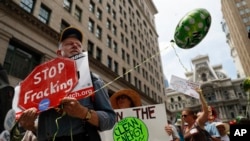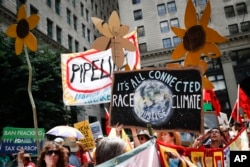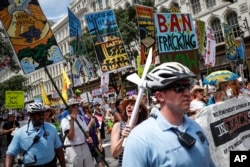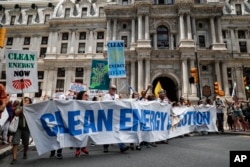"This election is about climate change, the greatest environmental crisis facing our planet," Vermont Senator Bernie Sanders said Monday night in his speech at the Democratic National Convention in Philadelphia.
The differences between the parties on this issue are stark. Many Republican leaders, including presidential nominee Donald Trump, deny the scientific consensus that greenhouse gas emissions attributed to humans are warming the planet dangerously.
But the issue also has helped deepen the rift between Sanders and Hillary Clinton in the race for the Democratic presidential nomination, a rift clearly visible as the convention opened.
Despite the friction on the left and the hostility on the right, experts say climate change will not decide many votes this November. Although polls show the public is increasingly concerned about it, climate change lags far behind other issues when most voters consider whom to vote for.
Fracking fractures
In an election season defined by fractures, it's perhaps fitting that hydraulic fracturing has been a major environmental issue.
The oil and gas drilling technique known as fracking has helped make the United States the world's leading producer of oil and natural gas. Oil imports have dropped dramatically.
Electric utilities are switching from coal to less polluting natural gas as prices plummet. Greenhouse gas emissions in the United States have declined, in part because of the switch away from coal, although experts debate the size of the impact.
The U.S. State Department under Hillary Clinton encouraged other countries to pursue fracking as a "cleaner alternative to coal and a way in which they could, potentially, create a more secure energy future for themselves." The issue was especially pressing at a time when Russia cut off natural gas supplies to Europe during a dispute with Ukraine.
But fracking has become a lightning rod in the U.S. environmental community. Fracking has contaminated some drinking water supplies. Injecting fracking wastewater underground has triggered earthquakes.
Leaking methane, a greenhouse gas much more potent than carbon dioxide, threatens to undermine the relative climate benefits of natural gas. And cheap natural gas threatens to postpone the end of fossil fuel use that many scientists say is necessary to avoid catastrophic climate change.
While the scope and scale of these problems are a source of intense debate, Sanders condemned Clinton in debates for failing to endorse his proposal to ban fracking. Anti-fracking protesters joined Sanders supporters Sunday in a demonstration in Philadelphia, ahead of the opening of the convention.
Worlds apart
But come November, experts say, disappointed Sanders voters will mostly back Clinton, in part because Trump's energy and climate plans are a world apart.
Clinton has called for stricter regulations on fracking and an accelerated transition to a renewable energy economy. Her proposals to tackle climate change won her endorsements from leading environmental groups, including the Sierra Club and the League of Conservation Voters.
Trump says Clinton's policies will increase the cost of energy. He has blasted Obama administration regulations as job killers and calls for lifting restrictions on domestic energy production. The head of an oil and gas company would serve as his energy secretary, according to reports.
Trump has called climate change a hoax and said he would "cancel" the U.N. climate agreement reached in Paris last December.
Divided public
These polar opposite approaches to climate and energy reflect a deep divide among American voters.
Although polling shows that concern about climate change is at an eight-year high, Democrats are much more concerned than Republicans. In one poll, nearly three-quarters of those who lean Democratic said the issue is very or extremely important to their vote for president, compared with just one-quarter of Republican leaners. That's the largest gap among the 17 issues surveyed.
However, even for Democrats, climate change is not among their biggest concerns. Terrorism, the economy, health care and education top the list for both parties.
"A lot of people say, yes, climate change is an important part of my vote," said Jay Campbell of the Democratic polling firm Hart Research Associates. But he added that when pollsters ask people to choose from among a list of issues, "climate change almost always comes out on bottom. It cannot rival the importance of education or job creation or, for Republicans, immigration or, for Democrats, Social Security."
Even Sanders' DNC speech revealed the gap. Of the 10 items Sanders said the election is about, he listed climate change ninth.







